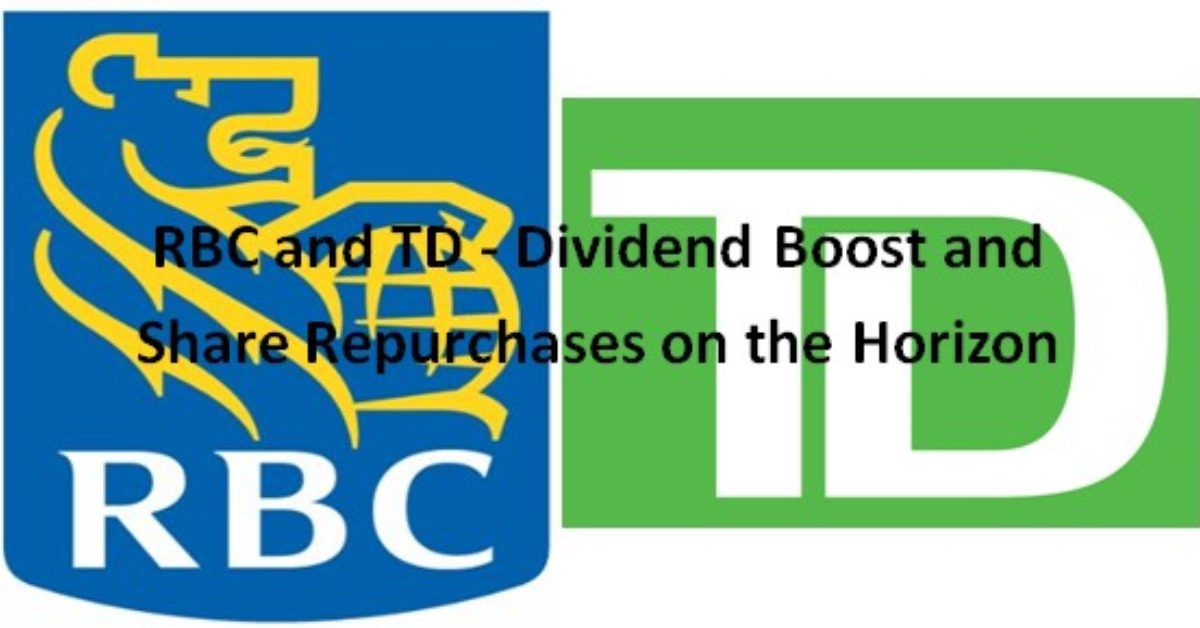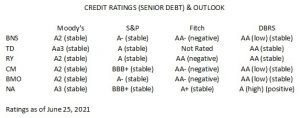I recently analyzed The Canadian Imperial Bank of Commerce (CM) and have written a guest post for Dividend Power about The Bank of Montreal (BMO) which should be posted within the next couple of weeks. I will not increase my position in either bank based on my analyses.
Like CM and BMO, The Royal Bank of Canada (RY) and The Toronto-Dominion Bank (TD) also stand to increase their dividend and to resume share repurchases once The Office of the Superintendent of Financial Institutions (OSFI) authorizes same. Since RY and TD are far superior franchises, I have acquired additional shares in:
- The Royal Bank of Canada (RY.to) in one of the ‘Core’ accounts within the FFJ Portfolio;
- The Toronto-Dominion Bank (TD.to) in a retirement account for which I do not disclose details.
NOTE: RY is the ticker symbol for The Royal Bank of Canada but the bank is commonly referred to as RBC.
Dividend and Share Repurchase Freeze
In March 2020, near the onset of the COVID-19 pandemic, OSFI imposed dividend increase and share repurchase restrictions in anticipation of a sudden drop in economic activity that could lead to cascading loan defaults that would diminish banks’ capital.
In addition to these restrictions, the major Canadian banks also took large provisions for potential losses in the early days of the crisis.
Having reviewed the results of the major Canadian banks subsequent to March 2020, we see the banks have returned to higher profit levels. In fact, the banks are now flush with capital since the pandemic failed to bring an extended wave of loan defaults.
As we shall see below, RY and TD are currently the least attractively valued banks within the group. Despite this, my experience of having worked in the Canadian financial sector my entire career prior to early retirement in mid-2016 leads me to favour RY and TD from a ‘quality of franchise perspective’.
RBC and TD – Credit Ratings
The credit ratings of the major Canadian banks are investment grade; investors can take comfort in the very low probability of a permanent capital impairment by reason of a bank failure.
The following table reflects the ratings assigned to the Senior Debt of Canada’s major banks.
When we combine RY’s and TD’s marginally superior ratings and the fact RY and TD have generated superior investment returns over a 20-year timeframe, we have to ask ourselves:
‘Why take on more risk in inferior banks for a reasonable probability of an inferior total long-term investment return?’
NOTE: You can use Tickertech to compare the performance over various timeframes.
A list of the members of the Canadian Bankers Association (CBA) is accessible here; not all banks operating in Canada are members of the CBA. Given that I have no exposure to National Bank (NA), Canada’s 6th largest, I am even less inclined to invest in any of the other members of the CBA which are publicly traded. My rationale for this is that I have sufficient exposure to this sector without having to go downmarket.
Dividends and Dividend Yield
RBC
RY’s dividend history is accessible here. The current $1.08 quarterly dividend has been in effect since the May 22, 2020 dividend payment date. With shares trading at ~$126, the dividend yield is ~3.4%.
TD
TD’s dividend history is accessible here. The current $0.79 quarterly dividend has been in effect since the April 29, 2020 dividend payment date. With shares trading at ~$87.55, the dividend yield is ~3.6%.
CM
CM’s dividend history is accessible here. The current $1.46 quarterly dividend has been in effect since the April 28, 2020 dividend payment date. With shares trading at ~$141.90, the dividend yield is ~4.1%.
BMO
The dividend history on BMO’s website is sorely lacking so I use the historical dividend data found on the TMX website. The current $1.06 quarterly dividend has been in effect since the February 26, 2020 dividend payment date. With shares trading at ~$127.50, the dividend yield is ~3.3%.
BNS
BNS’s dividend history is accessible here. The current $0.90 quarterly dividend has been in effect since the October 29, 2019 dividend payment date. With shares trading at ~$80, the dividend yield is ~4.5%.
I have absolutely no idea when, or the degree to which, OSFI will permit dividend increases and share repurchases. Although RBC’s and TD’s dividend yields are not the most attractive of the 5 banks, I do not chase yield and am willing to forego some dividend yield for a strong probability of generating a far superior total return.
Valuation
RBC
RBC’s adjusted diluted EPS guidance is:
- FY2021 – a mean of $10.85 and a $10.35 – $11.52 range from 14 brokers. With shares trading at ~$126, the forward adjusted diluted PE is ~11.61 using the mean value.
- FY2022 – a mean of $10.75 and a $10.16 – $11.63 range from 15 brokers. With shares trading at ~$126, the forward adjusted diluted PE is ~11.7 using the mean value.
TD
TD’s adjusted diluted EPS guidance is:
- FY2021 – a mean of $7.65 and a $7.35 – $8.16 range from 13 brokers. With shares trading at ~$87.55, the forward adjusted diluted PE is ~11.44 using the mean value.
- FY2022 – a mean of $7.53 and a $7.04 – $7.97 range from 13 brokers. With shares trading at ~$87.55, the forward adjusted diluted PE is ~11.63 using the mean value.
CM
CM’s adjusted diluted EPS guidance is:
- FY2021 – a mean of $13.86 and a $12.92 – $15.39 range from 14 brokers. With shares trading at ~$141.90, the forward adjusted diluted PE is ~10.24 using the mean value.
- FY2022 – a mean of $13.65 and a $13 – $15.01 range from 13 brokers. With shares trading at ~$141.90, the forward adjusted diluted PE is ~10.4 using the mean value.
BMO
BMO’s adjusted diluted EPS guidance is:
- FY2021 – a mean of $12 and an $11.27 – $12.89 range from 12 brokers. With shares trading at ~$127.50, the forward adjusted diluted PE is ~10.63 using the mean value.
- FY2022 – a mean of $11.86 and an $11.31 – $13.23 range from 11 brokers. With shares trading at ~$127.50, the forward adjusted diluted PE is ~10.75 using the mean value.
BNS
BNS’s adjusted diluted EPS guidance is:
- FY2021 – a mean of $7.66 and a $7.40 – $7.93 range from 12 brokers. With shares trading at ~$80, the forward adjusted diluted PE is ~10.44 using the mean value.
- FY2022 – a mean of $7.91 and a $6.99 – $8.47 range from 12 brokers. With shares trading at ~$80, the forward adjusted diluted PE is ~10.11 using the mean value.
RY and TD are the least attractively valued of the 5 banks at the moment. As noted earlier, however, I am willing to pay up a bit for quality.
RBC and TD – Dividend Boost and Share Repurchases on the Horizon – Final Thoughts
I have no idea when OSFI will lift the dividend increase and share repurchase restrictions. The broad sentiment in the investment community, however, is that these restrictions will be lifted within the next 6 months. In this regard, I think a dividend boost and the resumption of share repurchases from RBC and TD are realistic expectations.
Neither bank is the most attractively valued nor do they have the highest dividend yield amongst the Big 5. Both these banks, however, are far superior to CM, BMO, and BNS from a ‘quality of franchise’ perspective.
Far too many investors are making investment decisions primarily (solely?) based on dividend yield. A better way to approach an investment is to look at the overall long-term potential investment return. I recognize the past certainly does not predict the future but RY and TD have generated far superior returns over the past 20 years. Can this be replicated? I truly do not know but I am willing to take my chances.
Having said this, I am not exiting my CM, BMO, and BNS positions. I am just not aggressively adding to them.
Stay safe. Stay focused.
I wish you much success on your journey to financial freedom!
Note: Please send any feedback, corrections, or questions to finfreejourney@gmail.com.
Disclosure: I am long CM, BMO, RY, TD, and BNS.
Disclaimer: I do not know your individual circumstances and do not provide individualized advice or recommendations. I encourage you to make investment decisions by conducting your own research and due diligence. Consult your financial advisor about your specific situation.



